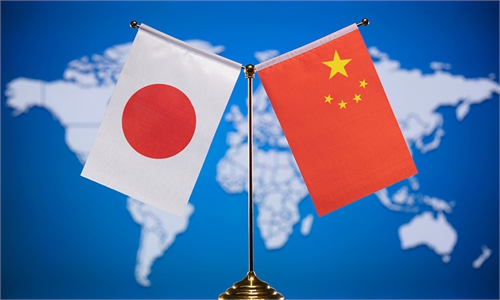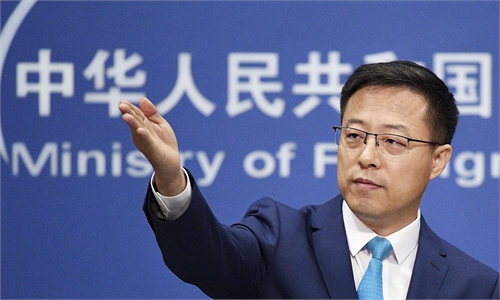IN-DEPTH / DIPLOMATIC CHANNEL
Japan’s failure to adjust mind-set toward China’s rise is the underlying cause of issues: former Chinese ambassador to Japan
Immovably together
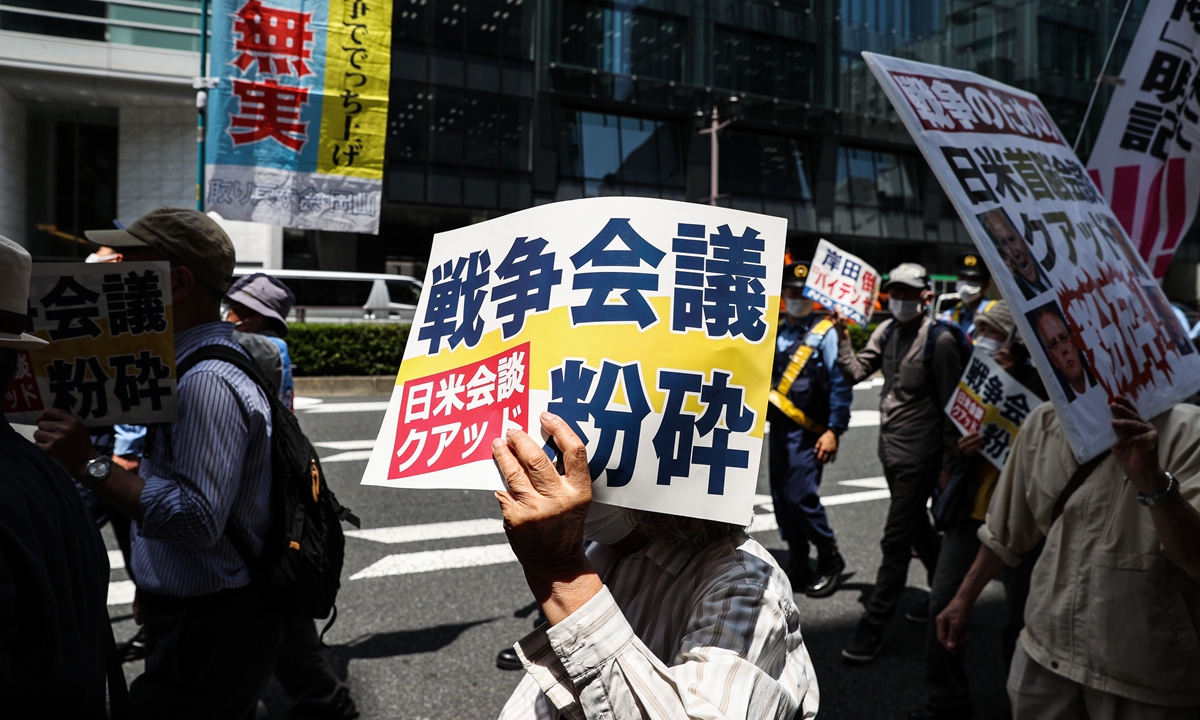
People hold signs and chant slogans during a march to protest against the US-led Quad summit on May 24, 2022 in Tokyo. Photo: VCG
The underlying cause for the problems in China-Japan relations in recent years is Japan's failure to adjust and change its mind-set and attitude toward China's rapid development, and an inability to reorient relations with China on that basis, Cheng Yonghua, former Chinese ambassador to Japan, told the Global Times in an exclusive interview.Japan should seriously and calmly consider this question: Whether it is better off with a stable and prosperous neighbor or with a turbulent and chaotic one, Cheng said. Many of the obstacles to China-Japan relations could be removed if Japan got clarity on this issue, Cheng noted.
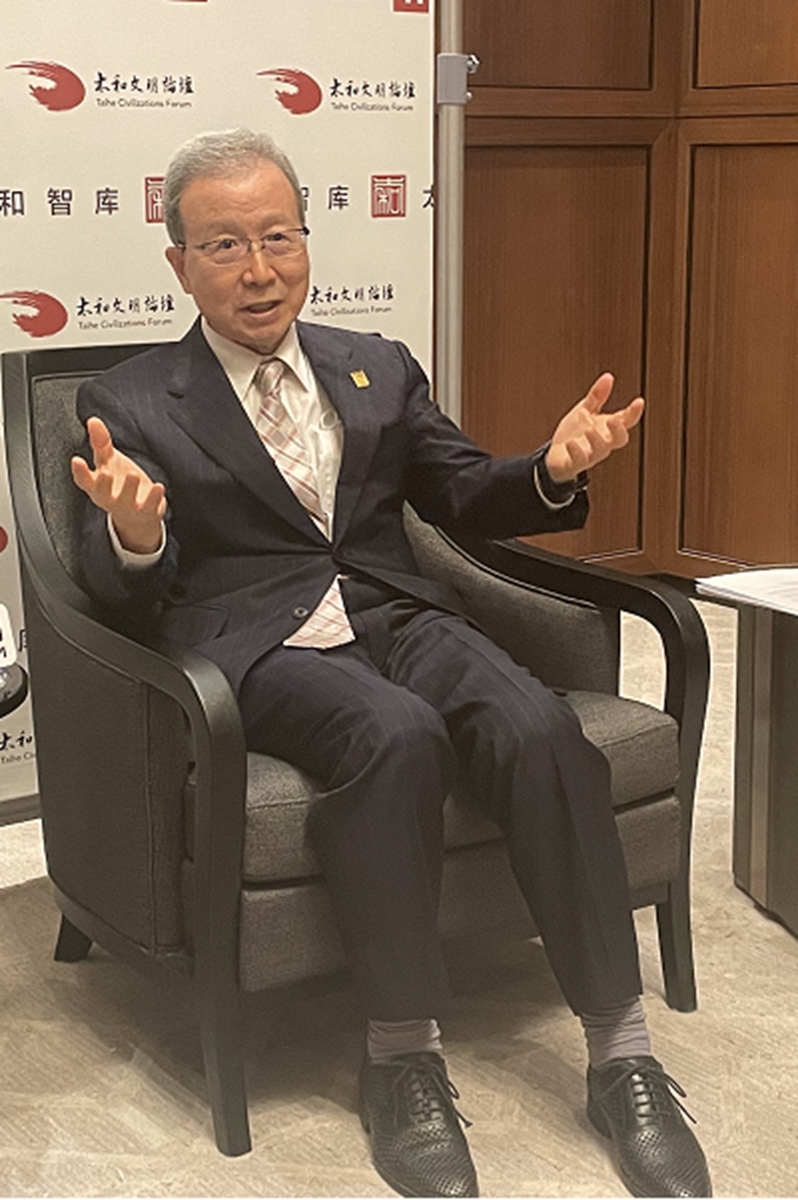
Cheng Yonghua, former Chinese ambassador to Japan Photo: Bai Yunyi/GT
Cheng made the remarks during the 6th Taihe Civilizations Forum, which kicked off on September 3 in Beijing. This year marks the 50th anniversary of the normalization of relations between China and Japan, however, it is hard to describe the current atmosphere of China-Japan relations as "festive," Cheng noted, as hostile remarks by some Japanese politicians and Japan's meddling in the Taiwan question overshadow bilateral relations."Against this backdrop, it is more necessary for us to think seriously and calmly about how to cherish the hard-won achievements in China-Japan relations over the last 50 years and not let them go to waste," Cheng pointed out. The common sticking point of many problems between China and Japan is how Japan should face the rapid development of China, Cheng said.
During his tenure as China's ambassador to Japan from 2010 to 2019, the bilateral relationship came to an important juncture when China overtook Japan as the world's second-largest economy in 2010. Cheng recalled that there were a variety of problems between China and Japan at the time, and the root cause of them was Japan's inability to adjust and change its mind-set in the face of China's rapid development.
Like other major powers, there is also competition between China and Japan, but the key point is how to "adjust mutual perceptions and reorient the relations," Cheng said.
The future of China-Japan relations may also face challenges, but as Cheng reminded the Japanese side many times in his speeches as ambassador, Japan should think about whether it is better off with a stable and prosperous China or with a turbulent and chaotic one, according to Cheng. "Japan should think about the question seriously and calmly."
China's development has, in fact, provided great opportunities for Japan's revival and redevelopment, which has been widely recognized by all parties in Japan. The yield of Japanese enterprises' investments in China is much higher than that in Europe, the US, ASEAN countries, and other regions.
At a time full of tension in the Taiwan Straits after US House Speaker Nancy Pelosi's provocative visit to the island of Taiwan, Japan has not only failed to maintain regional stability, but instead issued erroneous statements on the Taiwan question.
Keiji Furuya, a Liberal Democratic Party lawmaker in Japan and chairperson of the Japan-ROC Diet Members' Consultative Council, visited the island of Taiwan, which grossly interfered in China's internal affairs, blatantly violated the one-China principle and the spirit of the four China-Japan political documents, and sent a seriously wrong signal to the "Taiwan independence" forces, a Chinese foreign ministry spokesperson said in August.
Japan's recent moves are "very dangerous" and should "elicit vigilance," in particular, whether the country can continue to adhere to the path of peaceful development and whether this has come in "doubt," Cheng noted.
For instance, Cheng has observed that Japan's defense budget is expected to exceed more than 1 percent of gross domestic product. In public, the Japanese people and young students commemorate what happened in Hiroshima and Nagasaki each year, but some of them remain completely unaware of the Nanjing Massacre committed by the Japanese troops.
In addition to the marked shift to the right in Japanese politics, Japan is trying to play a bigger role in the process of cooperating with the US strategy, and Japan's actions on the Taiwan question is an example, Cheng said. The US is behind the agitation, but more important is the problem of Japan's perception and attitude toward China. In particular, Cheng said Japan should be cautious on the Taiwan question, where Japan had a 50-year history of disgraceful colonial rule.
People-to-people favorability between the two countries has also seen a cooling down. The proportion of Chinese respondents who have a favorable view of Japan has decreased to 26.3 percent, according to Japanese media in February.
At the beginning of the COVID-19 outbreak, in the early months of 2020, there was once a fairly benign interaction between the Chinese and Japanese peoples, with the most typical case being the mutual provision of material assistance, Cheng, who currently acts as executive vice president of the China-Japan Friendship Association, told the Global Times.
However, as the US government stigmatized its responsibility to China over the epidemic, it affected a significant portion of the Japanese population, and had a very negative impact on both China-Japan relations and civil sentiment in both countries, Cheng said.
He also pointed out that under the impact of the pandemic, humanistic exchanges between the two countries were interrupted, and both sides only learned about each other through the internet.
"The information from such channels could be invariably exaggerated and inaccurate, which in turn led to a further decline in the views of people of the two countries toward each other."
It is worth noting that although many polls show that the favorability of the Chinese and Japanese people toward each other is declining, at the same time, more than 70 percent of the people in both countries think that the other country is important for the development of their own country, which means that there is still a possibility that relations between the two countries, especially civil relations, will improve.
Standing at the 50th anniversary of the normalization of relations, China and Japan should expand exchanges and enhance cooperation, especially for the establishment of more channels, such as enhancing people-to-people exchanges among the youth of both countries, as a way to bolster the cross-country knowledge and understanding, Cheng suggested.
Cheng said that with regard to culture, the two peoples should also communicate with each other and reach mutual understanding.
"For the past 2,000 years, the Chinese and Japanese cultures have been in a relationship of mutual influence," he said. "The Chinese culture is vast and tolerant. China also needs to strengthen cultural exchanges with other countries, including Japan, to promote the development of relations between China and other countries."
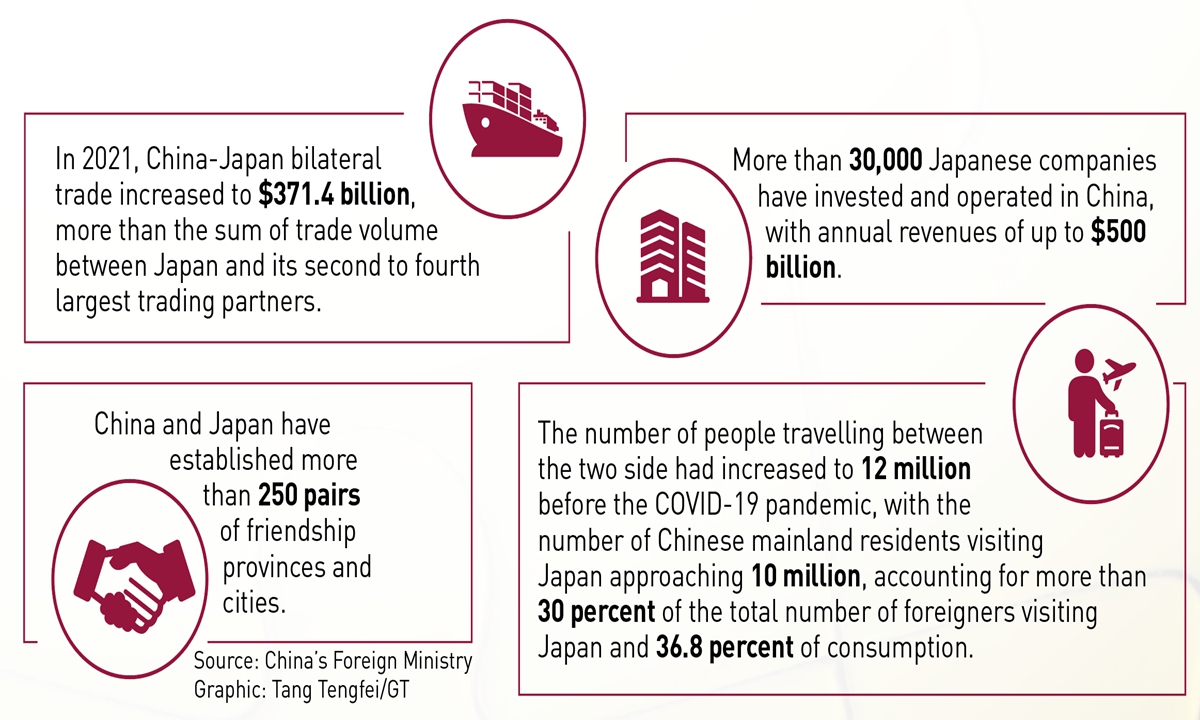
Graphic:GT
